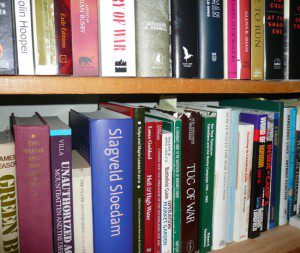
I think I remembered discovering it when I was about 11 years old. Until then, I had kind of dismissed it as a remote corner in my life. I think because I happened to be in a brand new school – in a village northeast of Toronto – there were lots of other places I chose to explore first: the baseball diamond, the cafeteria and gymnasium. Then, Mike Malott, my Grade 5 teacher, challenged us.
“You’ll have to complete your project on a world explorer by the end of the month,” he told us.
That’s when that remote corner in my life, that lower priority (after playing shortstop and after eating lunch) suddenly became important. I was going to have to face the music and go into the school library. I was actually going to have to build up the nerve, arrive prepared with pen and notepaper, and find the right words to ask for help.
“Where can I find stuff on Jacques Cartier?” I asked.
That’s when I first learned about Library of Congress reference numbers and microfiche (remember them?), searching index cards, cross-referencing names and locations, and calculating longitude and latitude on charts and maps. The school library suddenly introduced me to an entirely different dimension of life. It forced me to think and search for myself.
But it also introduced me to a new contact in my education – my first school librarian.
I have been reflecting about her (and for the life of me I cannot recall her name) this week as reports have emerged that schools in the Windsor-Essex Catholic District School Board are laying off library technicians and shutting down libraries. I did a little checking and have learned that some Ontario regions think more highly of school librarians than others. The Durham District School Board, for example, maintains a teacher-librarian in each of its 135 elementary and high schools. And according to one former librarian I spoke to this week, Durham is not in the habit of laying off librarians. Good news. But also worth campaigning to keep it that way.
Getting back to my Grade 5 history project, it wasn’t just the tools of the library – footnotes, bibliographies, tables of contents and indexes – that I learned from the school librarian back in 1960. No, she also helped me understand the value of somebody else’s research and writing. She taught me how to quote and paraphrase. She showed me how to explore maps, read legends, decipher geographical abbreviations and even how to read the longitude and latitude of Saint-Malo, from which Jacques Cartier first sailed in 1534. I even found instructions Cartier received from the King of France.
“(You will) discover certain islands and lands where it is said there is a large amount of gold and other riches,” the King had told Cartier.
As I soon learned from the stack of books the librarian let me borrow from the school library, Cartier never found gold. He did, however, discover and explore Newfoundland and Labrador. He travelled 1,000 miles up the St. Lawrence River. He even coined the name “Kanata,” a word in the Huron-Iroquois language meaning “village” or “settlement,” which of course stuck as the northern-most explored lands of North America.
That was just the tip of the North Atlantic iceberg. After the Jacques Cartier maps and stories, the school librarian introduced me to all those Lad and Lassie books; we even raced each other to see who could find and read the most in that series and later the Hardy Boys books. Then, there were the old West paintings of Charlie Russell and Frederic Remington and the wild West novels of Louis L’Amour. She introduced me to the world of Olympic sport, steam engines and the Amazon. She even directed me to the tales of aviation – John McCurdy’s Silver Dart, Charles Lindbergh’s Spirit of St. Louis, the great dirigibles R-100 and Hindenburg. Onward and upward. And somewhere along the way, I guess she inspired me to try my own hand at writing.
I’m afraid there’s lots of blame for some attitudes in Ontario that have made the school librarian obsolete and, in the eyes of some, dispensable. Google has replaced thoughtful researching with impatient clicking. Book aggregators have reduced the adventure of exploring a library book to instant gratification with a credit card. And the Mike Harris administration in Ontario during the 1990s downloaded professionalism in education to a profit and loss equation.
Nevertheless, I for one will never forget (or allow those around me to forget) the value of those people who lead young students into the world of books. Like Cartier found Canada, I found the words and pictures for much leisure, not to mention a livelihood. Long may the school librarian be encouraged to inspire the booklover in all of us.
I came upon your blog via the Ontario Library Association, and wanted to thank you for standing up for school librarians. Great to see!